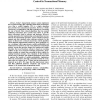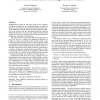283 search results - page 5 / 57 » Effective Program Verification for Relaxed Memory Models |
115
click to vote
SPAA
2005
ACM
15 years 8 months ago
2005
ACM
One approach in verifying the correctness of a multiprocessor system is to show that its execution results comply with the memory consistency model it is meant to implement. It ha...
125
click to vote
MICRO
2010
IEEE
14 years 9 months ago
2010
IEEE
Today's transactional memory systems implement the two-phase-locking (2PL) algorithm which aborts transactions every time a conflict happens. 2PL is a simple algorithm that pr...
124
click to vote
IEEEPACT
2005
IEEE
15 years 8 months ago
2005
IEEE
Global address space languages like UPC exhibit high performance and portability on a broad class of shared and distributed memory parallel architectures. The most scalable applic...
144
Voted
PLDI
2010
ACM
15 years 7 months ago
2010
ACM
Multithreaded programs are notoriously prone to race conditions, a problem exacerbated by the widespread adoption of multi-core processors with complex memory models and cache coh...
114
click to vote
ASPLOS
2004
ACM
15 years 7 months ago
2004
ACM
Sampling has been successfully used to identify performance optimization opportunities. We would like to apply similar techniques to check program correctness. Unfortunately, samp...



